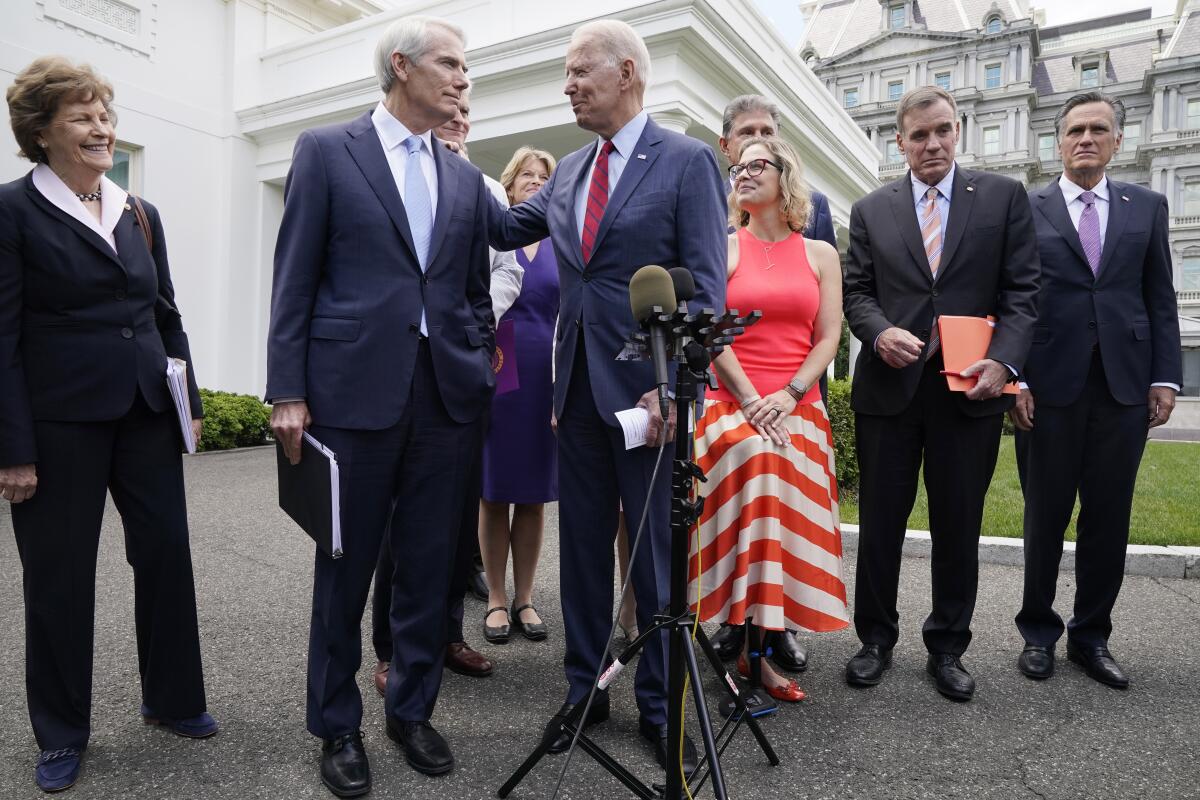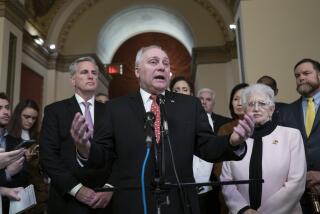Republicans who voted against Biden’s infrastructure bill are touting its projects anyway

Rep. Kay Granger (R-Texas) last year left little doubt why she was voting against a $1-trillion bipartisan infrastructure measure, calling it nothing more than a “socialist plan full of crushing taxes and radical spending.”
Yet, when the U.S. Army Corps of Engineers announced on Wednesday that very same infrastructure bill would be funding a $403-million flood control project in her district in the Fort Worth area, Granger wasted no time in hailing the effort.
“This is a great day for Fort Worth,” she said in a statement. She did not mention where the Army Corps was getting the money but thanked the agency for its “hard work and tireless commitment” to making her community safer.
Granger is not the only Republican cheering on projects generated by a bill that she voted to kill. In recent days, at least four other Republican members of Congress have praised initiatives made possible by the infrastructure law they opposed. Political analysts say they are not likely to be the last.
“Infrastructure remains a relatively nonpartisan issue, so even though those lawmakers may have not voted for the bill, they still have to answer to their constituents, and they want to align themselves with things that are popular,” said Cynthia Peacock, a professor of political communications at the University of Alabama.
The law, which passed Congress in November, drew bipartisan support. Nineteen Senate Republicans, including Minority Leader Mitch McConnell of Kentucky, voted with Democrats to approve the bill. In the House of Representatives, only 13 Republicans supported it.
The White House and the measure’s backers say it will create thousands of jobs, address a backlog of neglected infrastructure projects and create an electric vehicle charging network across the nation.
House Minority Leader Kevin McCarthy (R-Bakersfield) fought the legislation, as did former President Trump. They encouraged Republican lawmakers to block the bill, insisting it was bad policy and inextricably linked to a larger Democratic social spending package, an initiative that has stalled in the Senate.
If Democrats “brought just an infrastructure bill by itself up, you would find, overwhelmingly, Republicans want to work with you and get one through,” McCarthy said in October. “But what they want to do is restructure and transform America.”
Democrats and Republicans who supported the measure are expected to promote its benefits on the campaign trail ahead of the midterm elections. That has put Republicans who voted against the package — and its popular components — in a bind, especially as the government is expected to announce more projects in coming months.
Among the Republicans who bashed the law but are taking credit for its initiatives in recent weeks are two lawmakers representing Louisiana: Rep. Steve Scalise, the House minority whip, and Rep. Clay Higgins, whose district spans the southern part of the Bayou State.
Scalise, in a news release, highlighted $400 million in initiatives (made possible by the law) that mitigate flooding.
Higgins similarly applauded more than $190 million in funding for waterway projects in his district.
In a statement last week, Higgins was upfront about his opposition to “the infrastructure bill in its totality based on unwavering principle,” though he admitted “there are certain elements within the bill that my office fully supports.”
A spokeswoman for Scalise said in a statement that the congressman has long promoted funding for projects in his district.
“It’s unfortunate that Democrats decided to play politics with infrastructure,” the statement said, “and instead loaded their bill with unrelated liberal agenda items.”
Granger, the Texas Republican who commended the Army Corps of Engineers for addressing flooding problems, defended her vote against the legislation, saying she “wasn’t against this project.”
“I was against some of the other parts of that bill,” Granger said in a Thursday news conference.
A representative for Granger did not return emails seeking comment.
Douglas Heye, a former spokesman for the Republican National Committee, said it is common for lawmakers to oppose bills likely to pass even if it funds much-needed projects in their districts.
Lawmakers “may want to vote against the broader bill they think is too big despite supporting specific projects that benefit their districts,” Heye said.
Such tap-dancing has generated criticism.
When Rep. Ashley Hinson (R-Iowa) tweeted that she had helped secure millions in funding to upgrade dams along the Mississippi River, she quickly found herself in the social media crosshairs of Democrats.
“Tell the truth @RepAshleyHinson — you didn’t vote for this bill. You voted for a dam collapse. If you had your way your neighbors would be underwater,” Rep. Eric Swalwell (D-Dublin) tweeted. “Thankfully, @HouseDemocrats passed this bill and we did your dam job. Give me a break.”
Swalwell said in an interview that it was frustrating to watch Hinson and other Republicans “show up and take credit” as funding is doled out.
“If they were in the majority, the bill wouldn’t have passed,” he said.
A Hinson spokeswoman said in a statement that the lawmaker opposed the infrastructure package because it had been tied to the social spending plan.
“Since the bill was signed into law,” the statement said, “this money was going to be spent regardless.”
More to Read
Get the L.A. Times Politics newsletter
Deeply reported insights into legislation, politics and policy from Sacramento, Washington and beyond. In your inbox three times per week.
You may occasionally receive promotional content from the Los Angeles Times.








